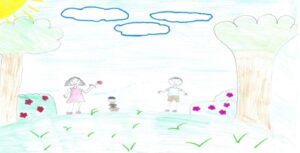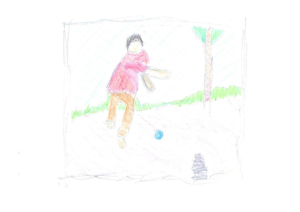A lovely blog written by one of our associate lecturers, Dr Renu Bhandari. 
COVID lockdowns have taught everyone the importance of the outdoors and its role in mental health. As we emerge from COVID gradually the importance of early years professionals using the outdoors for psychological, social, emotional well being of children cannot be denied. Natural open ended, freely available resources help in creating learning environments that are free of all. Outdoor environments can enable children to engage in imaginative, creative play and take on the challenge of the outdoors. Outdoor play does not require large spaces and a large investment. The key investment in making the most of outdoor play is imagination, free play, cooperation and large sums of creativity within a safe, natural environment.

Many traditional Indian games are set in the outdoors, teaching children the value of the environment and giving them an opportunity to connect with nature (Prakriti). The Indian culture and traditions hold nature at the centre of all exploration, risk taking, fun and teaching children the importance of the outdoors. Some traditional Indian games cited in folklores are even used now in settings for children 4 years to 14 years. Traditional games with sticks (Gili Danda), stones (Pithu, Gutte), body (kabaddi) and rope (Rasa) are used extensively. Some games like Posham Pa are played with micro tunes that help the young players to build rhythm, language and new words.
Pithu- This is a game played in two teams with a minimum of two members to twelve members. The game is played with a stack of seven flat stones which are piled in a circle. A ball is then thrown by a team member of the first team to unstack the stones. The team then works together to rebuild the stack of stones in the order the game started off with. The other team members pass the ball around and hit the members as they attempt restacking the stones. Each time the ball touches the team member they have to leave the game and pass the challenge to the rest of the team. To start the Pithu, the two teams explore the outdoors to find stones that are flat shaped and can be stacked well. Going out individually or in pairs to do this can be an enriching experience and time to bond with the team members. Once the stones are collected and ready the teams then take turns to decide which team takes the turn first to hit the stack. This game calls for strategy (Hindi word -Rananeeti) and planning (Hindi word-Yojana). The two teams have to work together, plan and guess the moves of each player to make sure that the task of restacking the piles of stones is achieved. The value of perseverance and hard work is a theme throughout this game.
Early years settings can create an inclusive environment by embedding traditional Indian games in practice. Involving children of different abilities, needs, cultures, religion and beliefs in activities can be easily created through these games. These games can help professionals learn from the past to make the best of now and the future along with language learning. They can act as a social psychological “cushion” for children with special needs. All early years professionals can create a “window to another culture” that sets in motion children’s creativity, agency and control through the use of these traditional Indian games.
